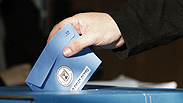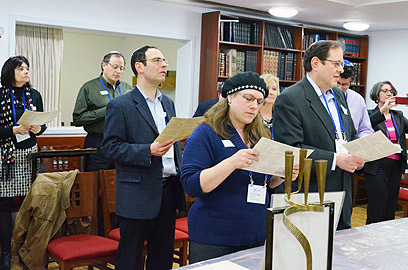
The 10 new Knesset seats
Op-ed: There are 600,000 men and women in Israel who are fed up with the status quo regarding religion and state. The slogan 'there is more than one way to be a Jew' will definitely influence how they vote on March 17.
He found out that the Conversion Bill made no progress without being well coordinated with representatives of the non-Orthodox streams. He was amazed to learn that new prayer arrangements at the Western Wall were being worked out with the broad backing of politicians from both the right and the left, and he saw how a new discourse on rights was developing and how the demand for freedom of choice regarding marriage was gaining supporters even among parties that had previously refused to touch with a 10-foot pole any initiative that could undermine the Orthodox monopoly in Israel.
Because politics is first and foremost about numbers. More than 7% of the Jews in Israel identify themselves as Reform or Conservative (about 50% each). This number has doubled – a 100% leap – over the past 10 years.
We have also learned from various studies (led by the survey conducted by Prof. Tamar Hermann of the Israel Democracy Institute) just how diverse this segment of the population is. The Reform community tends to lean to the center and left politically, while the Conservatives leans more towards the center and the right.
In other words, this is not a defined, one-dimensional pluralistic tribe, but rather a public that reflects, to a large extent, the core of the Israeli society: The center in its broadest sense – precisely that very elusive center whose victor will win the elections.

Several weeks ago, I participated in a panel at the Interdisciplinary Center (IDC). The topic was the rabbinical courts. The other participants included MKs Elazar Stern and Dov Lipman, Attorney Batya Kahana-Dror, and Rabbi Yehoshua Pfeffer.
The panel moderator asked me a question that many of my Orthodox friends like to raise: "Many secularists claim that the synagogue they do not attend is an Orthodox one. The liberal movements have failed in gaining a foothold among the Israeli public and remain an insignificant minority. How do you explain that?"
I spoke about the various studies that tell a very different story, but I felt that the members of the panel – all Orthodox, from liberal to haredi – didn’t really believe me. So I took a chance.
There were about 250 students in the packed auditorium, maybe even more. I asked for a show of hands from all those who had attended a Conservative or Reform prayer service. It was a moving sight. A sea of hands. More than half the students, men and women, raised their hands. The room was in an uproar. The astonished faces of the panel members were worth the risk I had taken.
The nimble, sharp politicians getting ready to serve in the next Knesset are already aware of this trend, and are preparing themselves accordingly. Just check out their schedules for the weeks ahead of Election Day.
If you translate this trend into numbers, we are talking about almost half a million voters. Add to this the pluralistic learning centers and the secular prayer communities, and you have 600,000 men and women who are fed up with the status quo regarding religion and state.
When politicians see this number, they subtract a third ("it must be an exaggeration," they say to themselves) and then divide the remainder by 40,000 votes. The result is 10 Knesset seats. Yes, you have read this number correctly: 10 seats.
This is not a "sector." These citizens will not vote for a particularistic interest, and will certainly not behave like a herd of sheep. But their blood is boiling. The slogan "there is more than one way to be a Jew" will not induce tens of thousands to take to the streets, but it will definitely influence what they will do in the polling booth on March 17.
Yizhar Hess is the executive director of the Masorti Movement.










